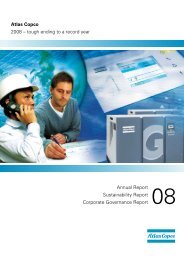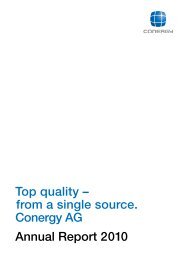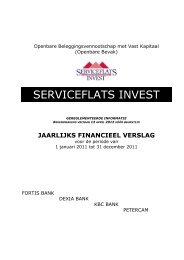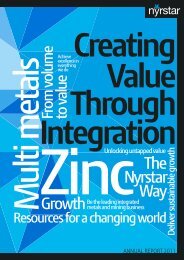BOC Report and accounts 2005 - Alle jaarverslagen
BOC Report and accounts 2005 - Alle jaarverslagen
BOC Report and accounts 2005 - Alle jaarverslagen
You also want an ePaper? Increase the reach of your titles
YUMPU automatically turns print PDFs into web optimized ePapers that Google loves.
72 The <strong>BOC</strong> Group plc Annual report <strong>and</strong> <strong>accounts</strong> <strong>2005</strong><br />
<strong>Report</strong> on remuneration<br />
The remuneration committee<br />
The remuneration committee comprises all the independent non-executive directors, namely Guy Dawson<br />
(chairman),Andrew Bonfield, Matthew Miau, Sir Christopher O’Donnell,Anne Quinn <strong>and</strong> Rebecca McDonald<br />
(appointed 1 July <strong>2005</strong>).Whilst neither the Group chairman nor the chief executive are members of the<br />
remuneration committee they both attend the meetings by invitation but are not present when their personal<br />
remuneration is discussed <strong>and</strong> reviewed.The Group human resources director acts as secretary to the committee<br />
<strong>and</strong> provides it with information <strong>and</strong> data from national <strong>and</strong> international surveys. He is assisted by the Group<br />
compensation <strong>and</strong> benefits director. In addition the remuneration committee has appointed Towers Perrin to advise<br />
on the remuneration arrangements for senior executives.<br />
The remuneration committee sets the overall remuneration policy of the Group <strong>and</strong> makes<br />
recommendations to the board on the framework of executive remuneration. It meets six times a year. Individual<br />
member attendance at the meetings is shown on page 66.The terms of reference are reviewed annually to ensure<br />
that they conform with best practice. Specifically, the remuneration committee determines, on behalf of the board,<br />
the detailed terms of service of the executive directors <strong>and</strong> other members of the executive management team<br />
including basic salary, performance-related bonus arrangements, benefits in kind, long-term incentives <strong>and</strong> pension<br />
benefits.The remuneration committee also reviews the remuneration of the chairman, following a<br />
recommendation from the chief executive <strong>and</strong> the senior independent director.The board as a whole determines<br />
the non-executive directors’ fees.<br />
Current expected value (chart 1)<br />
1 Fixed – 33%<br />
1<br />
2 Annual<br />
variable – 24%<br />
3 Long-term<br />
incentives – 43%<br />
3<br />
2<br />
Remuneration policy<br />
<strong>BOC</strong>’s remuneration policy for executive directors <strong>and</strong> other executive management is designed to attract <strong>and</strong><br />
retain executives of the highest calibre so that the Group is managed successfully to the benefit of its stakeholders.<br />
In setting remuneration levels the remuneration committee takes into account the remuneration practices found in<br />
other UK listed companies of similar size, internationality <strong>and</strong> complexity.The policy is to pay salaries <strong>and</strong> total<br />
remuneration around mid-market levels for on target performance <strong>and</strong> to provide the opportunity, via annual <strong>and</strong><br />
long-term incentives, for executives to be rewarded at the 75th percentile if this is justified by the achievement of<br />
top of the range performance goals. It is the view of the remuneration committee that performance-related<br />
remuneration should form a substantial element of total remuneration. Based on assumptions about expected<br />
values for awards from the Long-Term Incentive Plan (LTIP) <strong>and</strong> the Share Matching Plan (SMP), the proportion<br />
of performance-related remuneration to fixed remuneration (excluding pensions <strong>and</strong> benefits in kind) for current<br />
arrangements is approximately 67 per cent to 33 per cent (see chart 1).<br />
Last year, the remuneration committee made a number of changes to the performance-related elements<br />
of the executive remuneration package.These changes were approved by shareholders at the Annual General<br />
Meeting in January <strong>2005</strong>.The changes included the ceasing of option awards under the Executive Share Option<br />
Scheme, an increase in target <strong>and</strong> maximum value of the Variable Compensation Plan (VCP) with one third of the<br />
bonus being compulsorily transferred into a new SMP, <strong>and</strong> an increase in the maximum award level for the LTIP.<br />
The increase in the maximum LTIP award level was to ensure that the remuneration committee has the flexibility<br />
to remain fully competitive in the event that a higher level of award was required for an appointment to an<br />
executive role.The remuneration committee does not propose to make any significant changes to the executive<br />
remuneration package this year.<br />
Remuneration components<br />
Basic salary Salaries for executive directors <strong>and</strong> executive management board members are based on median<br />
market rates drawn from market data provided by remuneration consultants,Towers Perrin, <strong>and</strong> take account<br />
of an executive’s experience, responsibilities <strong>and</strong> performance. Performance is assessed both from an individual<br />
<strong>and</strong> business perspective. Remuneration for those executives of businesses outside the UK is denominated in the<br />
local currency.<br />
Benefits in kind Benefits in kind comprise company car benefits <strong>and</strong> membership of <strong>BOC</strong>’s healthcare insurance<br />
scheme.Where appropriate, directors on international assignment receive overseas allowances such as housing <strong>and</strong><br />
children’s education fees.These allowances are on similar terms to those applying to other employees on the<br />
international programme. Such benefits are in line with those offered by peer group companies. Benefits in kind do<br />
not form part of pensionable earnings.

















